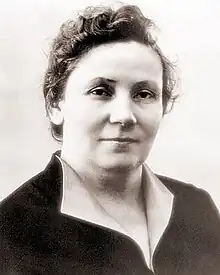Maria Kovrigina
Maria Kovrigina (1910–1995) was a Russian physician who served as the minister of health between 1953 and 1959 and was the first woman appointed to head a ministry at the All-Union level.[1]
Maria Kovrigina | |
|---|---|
 | |
| All-Union Minister of Health | |
| In office 1 March 1954 – 12 January 1959 | |
| Premier | Nikolai Bulganin Georgy Malenkov |
| Preceded by | Andrey Tretyakov |
| Succeeded by | Sergei Kurashov |
| Personal details | |
| Born | Maria Dmitrievna Kovrigina 1910 |
| Died | 1995 (aged 84–85) |
| Nationality | Russian |
| Political party | Communist Party |
Early life and education
Kovrigina was born in Urals in 1910 into a Russian family.[2][3] In 1924 she joined the local Komsomol and became its secretary after three years.[2]
In 1931 Kovrigina graduated from the worker's school.[3] She obtained a degree in medicine.[2] During her studies she joined the Communist Party.[3]
Career
Following her graduation Kovrigina began to work in Chelyabinsk and then was made the chief of staff of the regional department of health and education there.[2] In September 1942 she was named the deputy minister of health,[2][3] In this capacity she was responsible for the policies about the mother-child health.[3] In 1950, she was appointed the minister of health which she held until 1957.[4] When she was in office she managed to pass a law which lifted the prohibition of abortion in 1955.[5] Then Kovrigina served as the director of the department of pathology at the Moscow Central Postgraduate Medical School.[6]
Party career and views
Kovrigina was a member of the central committee of the Communist Party.[6] She was also part of the Soviet Women’s Anti-Fascist Committee which was established in 1941 to support the gender equality project in the Soviet Union.[5]
Personal life and death
Kovrigina died in Moscow in 1995.[2]
Awards
Kovrigina was awarded a medal for her activities in the siege of Leningrad during World War II.[2]
References
- [https://archive74.ru/sites/default/files/pn_2106_1.pdf
- Georgy Manaev (21 November 2020). "5 prolific women politicians in the USSR". Russia Beyond. Retrieved 18 March 2022.
- A. Lurie (14 January 1949). "Deputy health minister of USSR is woman physician". USSR Information Bulletin. IX (1): 151.
- Christopher Burton (December 2005). "Soviet Medical Attestation and the Problem of Professionalisation under Late Stalinism, 1945-1953". Europe-Asia Studies. 57 (8): 1221. doi:10.1080/09668130500351423. S2CID 155035057.
- Sasha Talaver (3 August 2020). "When Soviet Women Won the Right to Abortion (For the Second Time)". Jacobin. Retrieved 18 March 2022.
- Vladimir Bychkov (15 January 2013). "My Road to Freedom". HIAS. Retrieved 18 March 2022.
External links
 Media related to Maria Kovrigina at Wikimedia Commons
Media related to Maria Kovrigina at Wikimedia Commons